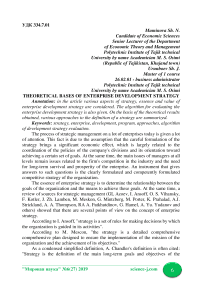Theoretical bases of enterprise development strategy
Автор: Muminova Sh. N., Urunboev Sh. J.
Журнал: Мировая наука @science-j
Рубрика: Основной раздел
Статья в выпуске: 6 (27), 2019 года.
Бесплатный доступ
In the article various aspects of strategy, essence and value of enterprise development strategy are considered. The algorithm for evaluating the enterprise development strategy is also given. On the basis of the theoretical results obtained, various approaches to the definition of a strategy are summarized.
Strategy, enterprise, development, program, approaches, algorithm of development strategy evaluation
Короткий адрес: https://sciup.org/140264819
IDR: 140264819 | УДК: 334.7.01
Текст научной статьи Theoretical bases of enterprise development strategy
The process of strategic management on a lot of enterprises today is given a lot of attention. This fact is due to the assumption that the careful formulation of the strategy brings a significant economic effect, which is largely related to the coordination of the policies of the company's divisions and its orientation toward achieving a certain set of goals. At the same time, the main issues of managers at all levels remain issues related to the firm's competition in the industry and the need for long-term survival and prosperity of the enterprise. An instrument that gives answers to such questions is the clearly formulated and competently formulated competitive strategy of the organization.
The essence of enterprise strategy is to determine the relationship between the goals of the organization and the means to achieve these goals. At the same time, a review of sources for strategic management (GL Azoev, I. Ansoff, O. S. Vihansky, F. Kotler, J. Zh. Lamben, M. Meskon, G. Mintzberg, M. Porter, K. Prahalad, A.J. Strickland, A. A. Thompson, RA A. Fatkhutdinov, G. Hamel, A. Yu. Yudanov and others) showed that there are several points of view on the concept of enterprise strategy.
According to I. Ansoff, "strategy is a set of rules for making decisions by which the organization is guided in its activities".
According to M. Mescon, "the strategy is a detailed comprehensive comprehensive plan designed to ensure the implementation of the mission of the organization and the achievement of its objectives."
As a condensed simplified definition, A. Chandler's definition is often cited: "Strategy is the definition of the main long-term goals and objectives of the

organization, adopting a course of action and allocating the resources necessary to fulfill these goals" [2, p. 58].
By definition, G.B. Kleiner, the company's strategy is an agreed set of decisions that have a decisive impact on the activities of an enterprise that have long-term and difficult to reverse consequences.
The representative of the Japanese school of management Michael Kolenso interprets the strategy as "the art of orienting the organization so that it continues to exist and achieved superiority over competitors." Thompson, A.J. Strickland argue that "strategy is the totality of all actions of managers that contribute to the achievement of the organization's goals; the current strategy of the company is partially planned and partially reacts to changing circumstances "[8, p. 37].
According to M. Porter, "the strategy can be seen as the impact of barriers to competitive forces or as a definition of the position in the industry where the company will be the least vulnerable to these forces" [1.26].
Having summarized and analyzed various approaches to the development of the strategy, G. Mintzberg identified ten schools of strategies:
-
1) prescriptive schools that view the strategy as a "big model", as a plan, as a position;
-
2) descriptive schools that represent strategy, such as vision, the process of thinking, learning, politics and power, culture and ideology, inevitability;
-
3) a structural school that considers the formation of a strategy, as a process determined by time and circumstances.
The strategy is a coherent integrated decision-making scheme. This means that the development of a strategy must be done consciously, and the strategy itself must be preactive. anticipate the influence of the environment. Its development must precede practical actions [5, p. 32].

strategic positioning lies in the choice of activities different from those of competitors "[1, p. 31].
The strategy determines the purpose of the organization, its objectives, action plans and resource allocation. Choosing a strategy means defining a competitive niche. The strategy for creating a competitive advantage takes into account the strengths and weaknesses of the organization, as well as the opportunities and threats that have arisen in the external environment. The strategy logically justifies the distribution of tasks at the higher middle management level, which ensures coordination of functions and organizational structure.
At the heart of strategy development now and for the foreseeable future is strategic analysis, which must be based on a large number of extremely diverse and mobile factors that are in the process of constant rapid changes and establishment of complex interdependencies. For different management objects, often operating in different socio-economic conditions and geographical environment, the specific weight of each of them is extremely different, and sometimes makes these factors incomparable. In this regard, we propose to abandon the direct copying of models and approaches that are not typical for the organization, and on their basis to develop fundamentally new, adapted models.
Список литературы Theoretical bases of enterprise development strategy
- Bogdanova TA, Gradov AP, Strategy and tactics of anti-crisis management of the firm - St. Petersburg.: Special literature, 2008, 273str
- Bowman K. Fundamentals of Strategic Management. M Unity, 2008, 213p.
- Gaponenko AL; Pankrukhin A.P. Strategic Management: A Textbook. - Moscow: Omega-L, 2004. - 472 p.
- Goremykin VA Planning in the enterprise M: Triksta, 2007, 226p.
- Kabushkin N.I. Fundamentals of Management: Proc. allowance / N.I. Kabushkin. 5 th ed. - Minsk: New knowledge, 2002. - 336p.
- Korolev VI Management, - M. Economist, 2006, 192p.
- Markova VD, Kuznetsova S.A. Strategic management. Lecture course. - M.: UNITY, 2000. -288 p.
- Prokopchuk L.O., Kozyrev A.A. Strategic planning: lecture notes. - St. Petersburg.: Publishing house of Mikhailova VA, 2000. - 64 p.
- Porter M. International competition: International Relations, 2007, 218p.


